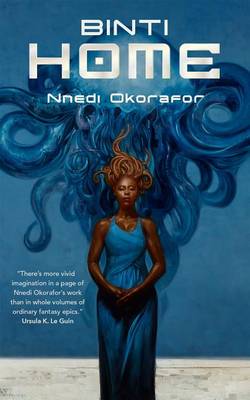
nannah
Written on Jul 7, 2021
Representation:
- the MC and her family are Himba, indigenous people...Read more
Ah, unfortunately The Night Masquerade is my least favorite of the trilogy, but I still love Binti and am very glad to have gone on this journey with her.
Representation:
- the MC and her family are Himba, indigenous people from parts of Namibia & Angola
- a love interest and some secondary characters are nomadic people described as “old old Africans”
Binti has discovered the Khoush are attacking her family and Okwu, so Mwinyi helps her rush back home. But finding harmony between the Khoush and the Meduse may be more difficult than she imagined, and in the attempt much of what she loves may be destroyed.
Binti’s story is an amazing journey with so much packed into its small size. I honestly can’t believe all that’s discussed: cultural identity, colonialism, prejudice and intolerance, the concept of otherness, among others. That’s a lot for three novellas! There’s definitely a reason why they’re as popular as they are.
So why was this my least favorite novella in the trilogy? I don’t actually mind the mystery behind the edan being what it was, I don’t mind that so many concepts weren’t actually explained or fleshed out (how DOES Binti’s otjize heal the Meduse, anyway?), and I don’t mind -- after some contemplation -- that Binti’s character seemed to regress in maturity. After all, she (show spoiler)[physically and mentally bonded with New Fish, who was very young] .
I think one reason it failed to captivate me as much was that consequences didn’t seem to stick as they have previously. For example, (show spoiler)[people came back to life (multiple times!)] . The story also had to kind of double back on itself to reason its way out of plot holes and sticky situations -- in a “but wait! actually it was okay, because [enter entirely new magical thing or concept] sort of way.
But this isn’t huge. I really love these novellas, and every one of Nnedi Okorafor’s stories that I read makes me just that much more eager for her next one.
Representation:
- the MC and her family are Himba, indigenous people from parts of Namibia & Angola
- a love interest and some secondary characters are nomadic people described as “old old Africans”
Binti has discovered the Khoush are attacking her family and Okwu, so Mwinyi helps her rush back home. But finding harmony between the Khoush and the Meduse may be more difficult than she imagined, and in the attempt much of what she loves may be destroyed.
Binti’s story is an amazing journey with so much packed into its small size. I honestly can’t believe all that’s discussed: cultural identity, colonialism, prejudice and intolerance, the concept of otherness, among others. That’s a lot for three novellas! There’s definitely a reason why they’re as popular as they are.
So why was this my least favorite novella in the trilogy? I don’t actually mind the mystery behind the edan being what it was, I don’t mind that so many concepts weren’t actually explained or fleshed out (how DOES Binti’s otjize heal the Meduse, anyway?), and I don’t mind -- after some contemplation -- that Binti’s character seemed to regress in maturity. After all, she (show spoiler)[physically and mentally bonded with New Fish, who was very young] .
I think one reason it failed to captivate me as much was that consequences didn’t seem to stick as they have previously. For example, (show spoiler)[people came back to life (multiple times!)] . The story also had to kind of double back on itself to reason its way out of plot holes and sticky situations -- in a “but wait! actually it was okay, because [enter entirely new magical thing or concept] sort of way.
But this isn’t huge. I really love these novellas, and every one of Nnedi Okorafor’s stories that I read makes me just that much more eager for her next one.


